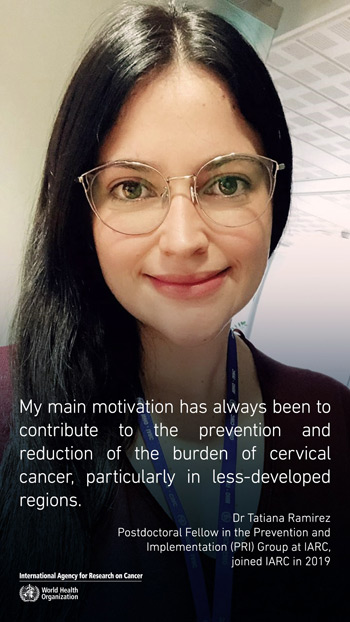❝My main motivation has always been to contribute to the prevention and reduction of the burden of cervical cancer, particularly in less-developed regions.❞
Please introduce yourself. How long have you worked at IARC, and where did you work before?
I am Arianis Tatiana Ramírez, a postdoctoral fellow in the Prevention and Implementation Group (PRI) at IARC. I have been at IARC for 10 months. Before coming to IARC, I obtained both my B.Sc. and my Ph.D. in Biomedical Science from Universidad de Antioquia in Medellín, Colombia. I was also an intern at the Centre for Cancer Prevention at the Wolfson Institute of Preventive Medicine at Queen Mary University of London, United Kingdom, for a year. I was exposed mostly to branches of microbiology and basic science, but I had scientific training in the molecular biology and molecular epidemiology of cervical cancer while obtaining my Ph.D.
What are the most interesting projects you are currently involved in, and why are they important?
I am currently investigating the use of molecular markers in triage strategies for cervical cancer screening. One of the projects that is being undertaken in PRI is the multicentre study of cervical cancer screening with human papillomavirus (HPV) testing and assessment of triage methods (Estudio multicéntrico de tamizaje y triaje de cáncer de cuello uterino con pruebas del virus del papiloma humano; ESTAMPA).
The main objective of the ESTAMPA study is to evaluate triage strategies for women older than 30 years who test positive for high-risk HPV types. My postdoctoral fellowship research includes the evaluation of molecular markers, such as p16 and Ki-67, and methylation and cytology testing as a triage strategy for HPV-positive women in Latin America.
What do you do when you’re not doing research at IARC?
You might find me practising some physical exercise; resting at home while I read a nice book, watch a movie, or drink a good Colombian coffee; discovering Lyon and some places nearby – I’ve been studying French, too – or having good times with my friends.
Why did you move into research?
I moved into research because, from the time I discovered it, I realized it was I wanted to do for my professional career. I remember at the beginning of my bachelor’s degree career I became interested in how some molecules could be important to predict and detect cancer in early stages. At that moment, I realized that research represented the best opportunity I could have had to translate my knowledge into a possible prevention strategy to decrease cancer rates. It is the best way to contribute to public health.
Which personal scientific contribution are you most proud of?
My main motivation has always been to contribute to the prevention and reduction of the burden of cervical cancer, particularly in less-developed regions. One of the main contributions I am most proud of is the main work from my Ph.D., which was recently accepted for publication by the International Journal of Cancer. We found that a test based on DNA methylation for triaging women who test positive for high-risk HPV had better sensitivity and fewer false positives than cytology plus HPV16/18 testing. This paper represents the first time that S5 methylation has been tested head-to-head against cytology and HPV16/18 testing. As affordable methylation tests become available, this strategy may prove useful for triage in low- and middle-income countries.
What is something you do now because of research you’ve read?
Some articles on how to build and grow an international research network advise creating an international network of collaborators using social media. I have started to frequently use some platforms, such as Twitter, LinkedIn, and ResearchGate, to track research related to my work topic, to stay up to date with recent advances in my field and find out what others are doing. These digital tools allow people to exchange thoughts and learn more about their views on different subjects. The best time to start growing your network is now!.
